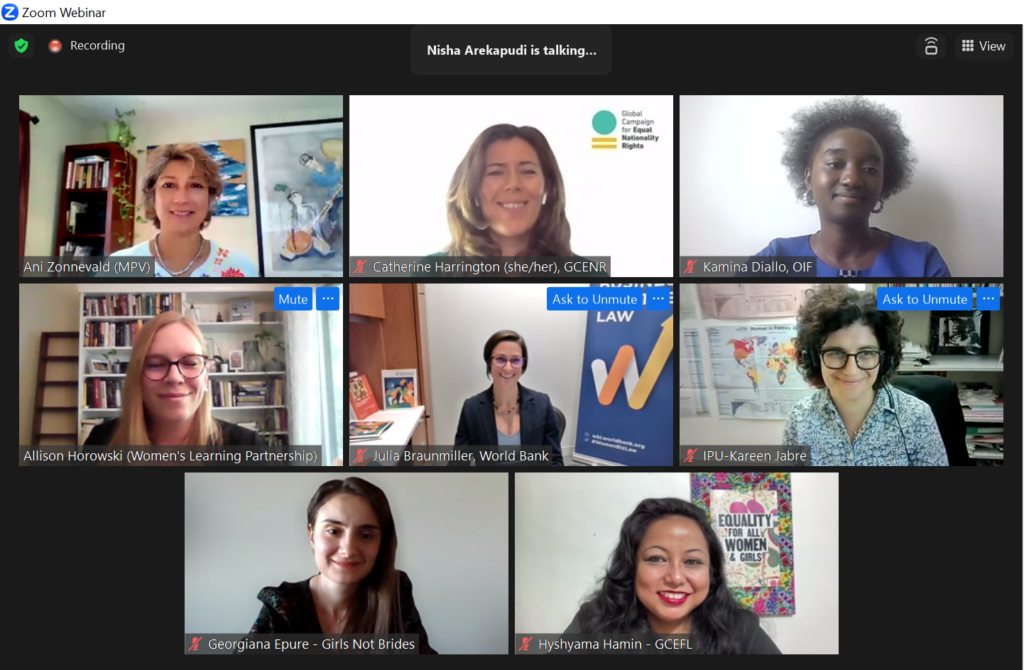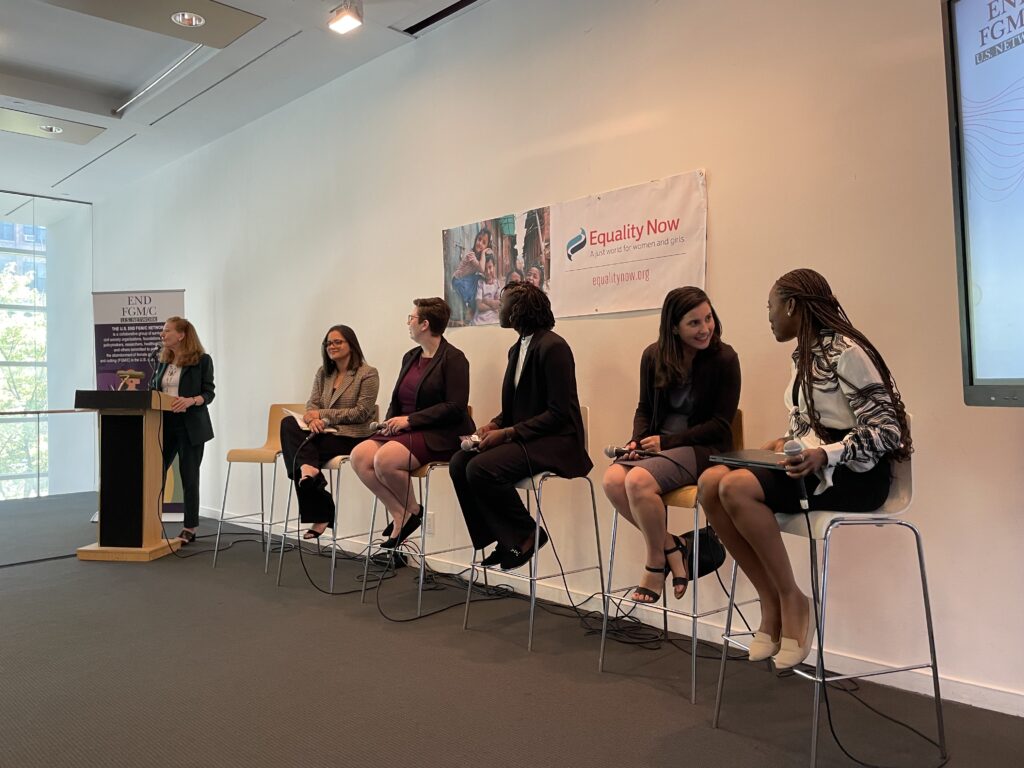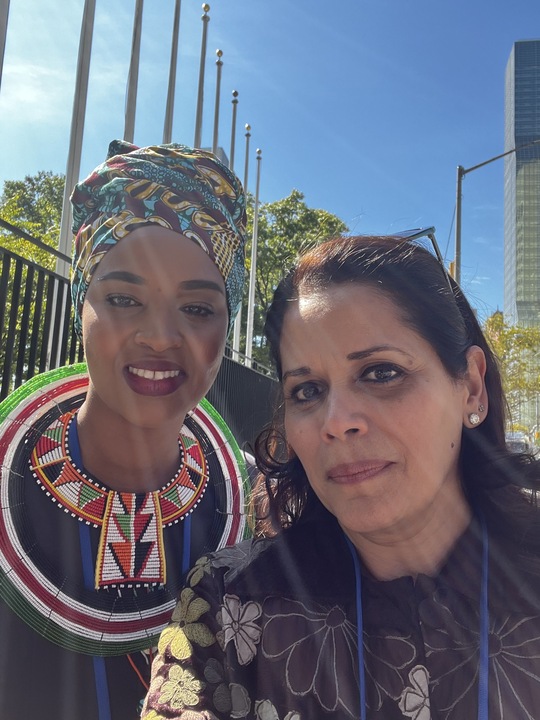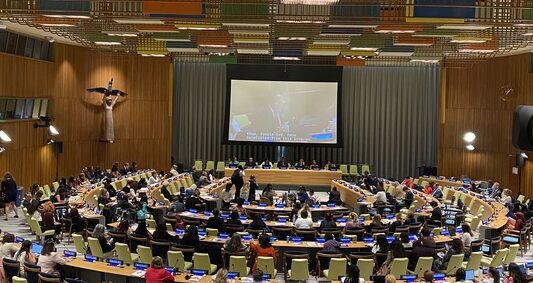The 78th UN General Assembly (UNGA) was a jam-packed couple of weeks (any New Yorker will tell you the streets most certainly were!) with heads of state and other high-ranking government officials from around the world, leaders of UN bodies, and representatives of civil society coming together to address the world’s most pressing issues. Equality Now and our partners were there reminding governments that the deadline for fulfilling the Sustainable Development Goals (SDGs) is drawing near, so they have no time to waste to ensure legal equality for all women and girls, end FGM/C and child marriage, and ensure gender equality and human rights continue to be at the core.
Bringing a focus on legal equality

The expert-packed group of speakers in the “Accelerating Action toward Equality in Law for Women and Girls by 2030” virtual event on September 14th hosted by UN Women stressed the importance of galvanizing leadership, inspiring activism, and harnessing data in the push to repeal and revise gender-discriminatory laws.
Catherine Harrington of the Global Campaign for Equal Nationality Rights (GCENR) outlined progress made in several countries, highlighted the activism of women in Malaysia affected by discriminatory nationality laws, and noted that remaining discrimination in nationality laws “creates unnecessary suffering”. Hyshyama Hamin of the Global Campaign for Equality in Family Law (GCEFL) spoke about the Coalition’s achievements and noted how “important it is to ground activism nationally, regionally, and globally in the lived realities of how discriminatory family laws and practices impact women and girls…and that those most affected by the discriminatory laws and practices are the ones who lead the call for reforms.” She also recognized that these laws are among the slowest and most challenging to amend, repeal or codify because often culture and religion are used as a basis to keep these laws in their discriminatory state. The discussion closed on a hopeful note as panelists shared their strategies for continuing to hold governments accountable going forward.
Tools for addressing FGM in the United States

Later that same day, Equality Now, representatives of the US End FGM/C Network, activists, academics, law enforcement professionals, and survivors of female genital mutilation or cutting (FGM/C) came together in person to discuss the challenges and progress in the fight against the practice in the United States, and to share two essential new tools to map progress and combat the FGM/C through the law:
- A interactive state-by-state map, that highlights the states with and without laws against FGM/C in the United States. The map’s hover feature also provides the latest available data on the number of women and girls impacted by FGM/C in every state, as well as clickable links to the official legal text for each state law. In addition, for researchers and academics, a table with all of this information including best practice provisions is available on a separate webpage.
- A Training Manual for Legal Professionals on FGM/C in the U.S. which provides invaluable guidance to lawmakers, legal practitioners, and others in drafting, enacting, and enforcing laws to combat FGM/C. The manual will be available online soon. Sign up here to receive a copy.
Jill Thompson, Equality Now’s Regional Representative for North America and Global Lead on Adolescent Girls, who moderated the panel discussion, stressed the universality of the problem, noting that “FGM/C varies depending on the country in which it’s performed. But the one thing they have in common is that it has no health benefits and it’s intended to control women’s sexuality.” Caitlin LeMay, Executive Director of US End FGM/C Network, also highlighted the global nature of FGM/C – and of solutions – saying “As we launch the legal manual, some other countries are doing a lot better than we are, so the U.S. can learn from them in eradicating the practice.”
Attendees and panelists alike lingered well after the formal discussion had concluded, and expressed their excitement about the tools, and about the many opportunities they saw to connect and to continue working together to end FGM/C in the United States.
New connections and renewed commitments

September 16 and 17 were the SDG Action Weekend, including the Generation Equality Midpoint Moment, and the two days were rich in opportunities for connection. Equality Now Staff and partners attended numerous events and discussions with government representatives around the world, many UN bodies and agencies, and philanthropic foundations.
The Generation Equality Midpoint Moment on the 17th was particularly noteworthy, with officials from Afghanistan, Canada, Cote d’Ivoire, the European Union, Finland, France, Iceland, Kazakhstan, Kenya, Malawi, Mexico, Spain, Sweden, Tanzania, the United Kingdom, and the United States as well as the Deputy Secretary General of the UN, the World Bank, UN Women, the Global Fund for Women, the Gates Foundation, the Ford Foundation, the United Nations Population Fund, and others. Member states began by reviewing progress and results, with the Prime Minister of Iceland stressing that “Gender equality is not just a ‘nice to have’,” and Kenya’s Principal Secretary, State Dept. Culture and Heritage Ummi Bashir highlighting Kenya’s role as a Gender-Based Violence (GBV) Action Coalition leader, their work on ending FGM through an innovative program empowering women economically, and working with civil society organizations.

Next, member states and other stakeholders discussed their financial and action-focused commitments and shared specific plans to implement gender mainstreaming in national policies and programs. Equality Now made careful note of all these commitments and will work with our partners to continue to hold governments to their word.
Later in the week, Equality Now staff attended more events, including a high-level event “Charting brighter futures: Utilizing data for accelerated action to end child marriage and achieve SDG 5.3” at which Canada, Zambia and other governments, the Global Programme to End Child Marriage and Girl not Brides, emphasized the importance of a comprehensive approach to ending the practice, including greater youth involvement, education, legal reform, and working more closely with religious and traditional leaders.
What’s next?
The work doesn’t end when the last world leader heads to the airport. Now it’s time for Equality Now and our partners to follow up on new connections and invite new allies to join our coalitions and collaborate with us in the lead-up to the Summit of the Future at the next UNGA in September 2024 where the Global Digital Compact will be adopted and UN reform discussed. It’s time to assess the progress reported and all the commitments to gender equality made by different governments and show them how we can lend our expertise as they work to implement their plans. And it’s time to look hard at all the places where sex and gender-discriminatory laws and practices are still harming women, girls, and their communities, and keep pushing for reform. It’s time to change the rules.